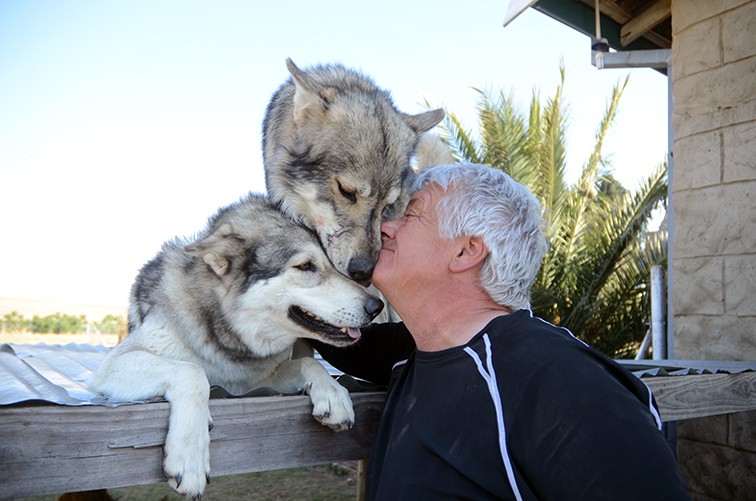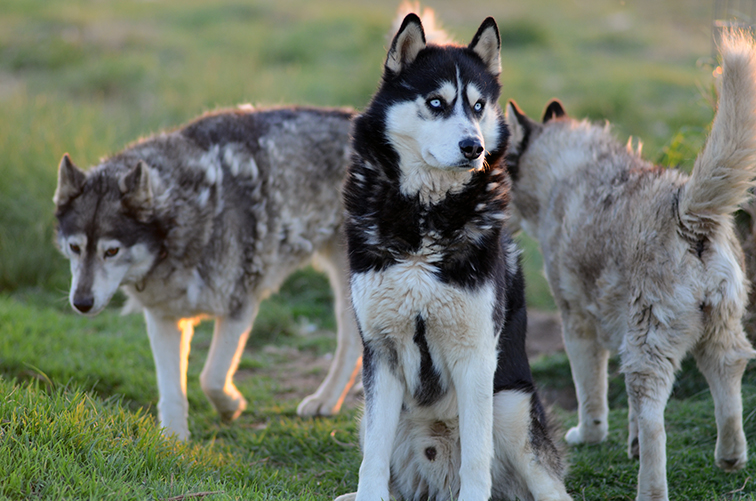As South Africans, we are accustomed to wild animals and it’s not everyday that you hear about a wolf sanctuary. But if you take a two-hour drive from Johannesburg, you will find one the biggest wolf sanctuaries in the southern hemisphere.
Larry Wayne Paul is the founder of HuskyRomi Wolf Sanctuary, a non-profit organisation providing a safe haven for abandoned and abused huskies and wolves in South Africa.
He explains that when he started the sanctuary over a decade ago, he never expected the wolf population to take over as it did.
“The sanctuary is husky driven as it started out as a haven for huskies because there are so many huskies in Johannesburg looking for homes. At that stage, I had 18 huskies. So, we decided to find somewhere where we can bring the huskies and just create a nice place for them.”
Click below to watch the journey to the wolf sanctuary in Reitz, Free State:
“The wolves were never supposed to happen. We got a call from Port Elizabeth about three wolves, drove down, came back with 12. Got another call; went down to fetch 13 and came back with 37. So, it just evolved and we’ve been collecting wolves because we’ve got this reputation and truthfully, we are the only wolf rescue in the southern hemisphere. We get calls from all over the country and we take them in.”
There are 300 hounds on the property which consist of around 220 wolves, 50 huskies, hybrids and a handful of domestic dogs rescued from the surrounding area. There are even horses Larry took in from severe neglect and a cow named Moo.
“I got my first husky from the neighbours because he was too much to handle for them. At that stage, I was running everyday. So, he would come running with me. Then one day they said Romi loves you far more than he loves us – don’t you just want to keep him? And that’s where this whole passion started with the huskies.”

He stresses that even though films and television shows make wolves and huskies look desirable as a pet, they take up a lot of effort, time and understanding.
“There are so many wolves and the sad thing is that there are so many people breeding them. People think it’s cool to own a wolf. When they are young, they’re gorgeous, just like huskies. They really look lovely and everyone wants one, not realising that this is an animal that is semi-wild and also very demanding. They get to a certain age and then people realise that they’ve bit of more than they can chew.”
“I have always said the perfect owner for a wolf is somebody is over 40, works from home and is an introvert because then you’ve got your companion, your buddy and you don’t have any outsiders getting in the way – but not many people fit that description, especially young guys who think it’s really cool to own a wolf but then they go out or away, neglect the animal and it becomes destructive.”
Israel Sikhosana has been working with the wolves for a decade alongside Larry. Sikhosana explains that he has a great passion when it comes to these four-legged creatures.
“At first I was scared of the wolves but after a couple of years, I saw what a nice animal it is. I’m not scared of them anymore, I love them so much. I give them some food and these animals have no problems with me. When they are sick, I tell Larry and then he’ll come fetch them or give them medicine.”

Wolves are not indigenous to the country and there are many rumours as to how the hounds made their way to the continent. One is that the South African National Defence Force (SANDF) or the police – or both – imported wolves decades ago to create a super breed dog, an initiative that obviously failed.
Backyard breeders are rife with even domestic dogs and the same can be assumed for wolves as breeders continue to sell these howling hounds to the public, creating the population we see today. Regardless of where the wolves came from, the fact is that there are a high number of wolves in South Africa, all of which are in captivity.
It’s no secret that a high number of huskies end up in shelters in South Africa due their owners not being able to handle the high energy of this working dog. Larry explains that the breed of the dog is very demanding and not a choice in pet to be taken lightly.
“The unfortunate part about a husky is that aesthetically it’s most probably the nicest looking pet. People see a gorgeous cuddly little fluffy ball and they want it. They don’t realise that they are taking home most probably the biggest nightmare in the world.

“Huskies on their own are very demanding, they are constantly looking for attention, they get very bored when they are neglected and in turn, they start to destroy the garden, the car, whatever they can get hold of. Most people don’t realise when you get a husky, you should get two or three huskies because then you have a pack at home and they are constantly busy with each other and not just lying around totally bored.”
The HuskyRomi Sanctuary offers tours and even the opportunity to volunteer to live and work with the animals. Larry knows each hound by name and talks about their personalities and background at great length.
“We don’t adopt out wolves. There are so many wolves in South Africa looking for homes and we believe that our wolves are in a nice environment with big enclosures. They get lots of food and they get lots of attention. Rather leave our ones alone and give another one a chance.”
“It’s the same with huskies; we can’t sustain ourselves like other rescues by adopting out so everything that comes here stays here. That’s why we call ourselves a sanctuary, it’s a place of safety. There are 250 huskies looking for homes every day in Johannesburg so rather give them a chance because they are going to end up being euthanised.”







